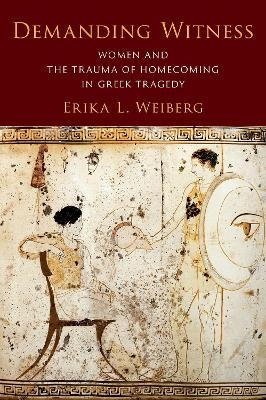
Demanding Witness
Women and the Trauma of Homecoming in Greek Tragedy
Seiten
2024
Oxford University Press Inc (Verlag)
978-0-19-774732-2 (ISBN)
Oxford University Press Inc (Verlag)
978-0-19-774732-2 (ISBN)
Demanding Witness investigates how the trauma of female characters is represented and received in four Greek tragedies about homecoming: Aeschylus' Agamemnon, Sophocles' Women of Trachis, and Euripides' Heracles and Helen. Through discussions of modern trauma concepts alongside historical and literary analyses of these plays, Erika L. Weiberg examines how and why female characters' expressions of psychological pain are hotly contested, silenced, and suppressed by other characters and sometimes by the plot of the play itself.
Tragic representations of female noncombatants' trauma after war expose the ripple effects of violence that wars create, even for individuals and communities distant from the fighting. At the same time, these characters' expressions of trauma also create a conflict of witnessing for other characters and the audience. By shifting focus to the returning hero's wife and the women he enslaves, Weiberg calls attention to the detrimental effects of structural and chronic forms of trauma in addition to trauma caused by discrete, catastrophic events.
Weiberg argues that recognizing women's trauma in these tragedies requires questioning how Greek society was organized through hierarchies that privilege the hero's story of trauma and recovery to the exclusion of other types of stories and experiences.
Tragic representations of female noncombatants' trauma after war expose the ripple effects of violence that wars create, even for individuals and communities distant from the fighting. At the same time, these characters' expressions of trauma also create a conflict of witnessing for other characters and the audience. By shifting focus to the returning hero's wife and the women he enslaves, Weiberg calls attention to the detrimental effects of structural and chronic forms of trauma in addition to trauma caused by discrete, catastrophic events.
Weiberg argues that recognizing women's trauma in these tragedies requires questioning how Greek society was organized through hierarchies that privilege the hero's story of trauma and recovery to the exclusion of other types of stories and experiences.
Erika L. Weiberg is Assistant Professor of Classical Studies and Theater Studies at Duke University.
Acknowledgments
Abbreviations
Introduction: Beyond the Trauma Hero
Chapter One: Moral Injury in Aeschylus' Agamemnon
Chapter Two: Insidious Trauma in Sophocles' Women of Trachis
Chapter Three: Ambiguous Loss and Euripides' Heracles
Chapter Four: Euripides' Helen and the Trauma of Survival
Conclusion: Whose Trauma Matters?
Bibliography
Index
| Erscheinungsdatum | 07.02.2024 |
|---|---|
| Verlagsort | New York |
| Sprache | englisch |
| Maße | 229 x 165 mm |
| Gewicht | 476 g |
| Themenwelt | Literatur ► Klassiker / Moderne Klassiker |
| Geisteswissenschaften ► Sprach- / Literaturwissenschaft ► Anglistik / Amerikanistik | |
| Geisteswissenschaften ► Sprach- / Literaturwissenschaft ► Literaturwissenschaft | |
| Sozialwissenschaften ► Politik / Verwaltung ► Politische Theorie | |
| Sozialwissenschaften ► Soziologie | |
| ISBN-10 | 0-19-774732-9 / 0197747329 |
| ISBN-13 | 978-0-19-774732-2 / 9780197747322 |
| Zustand | Neuware |
| Informationen gemäß Produktsicherheitsverordnung (GPSR) | |
| Haben Sie eine Frage zum Produkt? |
Mehr entdecken
aus dem Bereich
aus dem Bereich
Poetik eines sozialen Urteils
Buch | Hardcover (2023)
De Gruyter (Verlag)
CHF 83,90
Buch | Softcover (2024)
belleville (Verlag)
CHF 27,95


